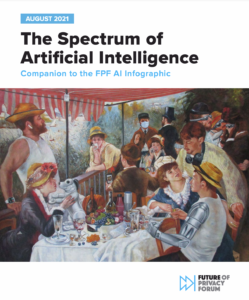SXSW Edu – FPF and Colleagues Take on "Trust" Question
February 4, 2016
Brenda Leong
I am heading to SxSW Edu to join the US Department of Education Chief Privacy Officer Kathleen Styles, Common Sense Media’s Bill Fitzgerald, Data Quality Campaign’s Aimee Guidera, and several other distinguished education and privacy speakers for this session on student data privacy. Sponsored by CoSN, this is not just a panel but a full 3-hour session to dig into the top issues, questions, and challenges of how to maximize the benefits of ed tech for our school children while protecting their data, their interests, and their future. It can only happen if we can find a way to inspire and maintain trust among and between all the players. As advertised, this session will cover:
“Concerns around the privacy of student data have been rising and educators are increasingly on the defensive as parents believe too much data is collected about their children, it is not secure and too often inappropriately used for commercial gain. Trust is at the heart of the privacy debate. Last year the Student Data Principles were endorsed by 40 education associations, and over 200 companies have signed a Student Privacy Pledge. Learn how we can build trust through better educator training, improved review of education apps, clearer vendor agreements and building a “seal” validating trusted learning environments. Participate in an interactive forum on what else is needed.”
The key word there is “participate”! This session is about listening and learning and considering – all points of view, all ideas and suggestions. If you can’t be there – reach out to one of the speakers in advance with your thoughts and inputs. We’ll take it all!
Here are some of my thoughts on the background of the discussion I hope that we’ll be having:
At the point of impact, there are two primary actors: the school and the vendor. Schools and vendors generally want the same thing – good outcomes for students; and the DQC-sponsored Student Data Principles (values from the educator perspective) the FPF/SIIA-led Student Privacy Pledge (commitments by ed tech companies) reflect that priority. Ideally, they work in partnership – the vendor providing a useful product or service which then allows the school to offer strong educational opportunities. But as with any relationship, “it’s complicated.”
Which vendors should schools choose to incorporate – how do they know who to trust? Screening platforms, Seals, Pledges – all these and more are available, but from the school’s perspective there’s no silver bullet or easy way through the wickets of writing a contract or selecting an app and being completely sure you’re doing the right thing.
Even before that point, though, schools are making choices. What counts as a vendor and who should be able to incorporate the product – an app the teacher tells everyone to download? – only an account the school requires the student to create? What role should school IT offices play – and what about the many, many districts where there simply aren’t resources for this type of oversight? What is the burden on teachers – let’s try not to conclude they have to be IT specialists now too!
Even when schools and vendors work together efficiently toward a productive result, their job isn’t done. They operate as the agents, but the true “stakeholders” are the parents and students for whom this process takes place. They must be made aware of the decisions being made, the controls in place for them to exercise, and their own responsibilities.
Of course, we can never skip over the legal implications – some laws put the burden schools; some on vendors, and in either case, how do we control the risks without limiting the ability of either to function most effectively? New laws are considered out of the public debate about how much limitation over student data is the right amount; who should have access and when; what are those controls should parents have.
I’m sure you’ve noticed more questions than answers here – and I know, despite my immense respect for my co-speakers, we will not solve them all in one session! But if trust is part of the answer – and I think we all believe it must be – then we have to start somewhere, and this session is a “next step” in this on-going process to implement ed tech smartly, responsibly, and thoughtfully to minimize risk and prevent harm so we can enjoy the tremendous benefits data and technology offer to our schools and our students.
Hope to see you there!
Last Updated: December 14, 2020



